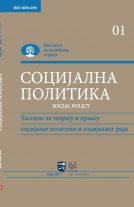- Home page
- Researchers
- Jelena Birmančević
Jelena Birmančević

LIVING AND WORKING CONDITIONS OF INFORMAL COLLECTORS OF SECONDARY RAW MATERIALS
The main subject of this paper is the living and working conditions of informal collectors of secondary raw materials. The aim is to show the specific difficulties that this sensitive group of workers encounters in their life and work. The conducted research (for the needs of the master's thesis) was realized in Šabac, in the period October-November 2018. It is an empirical research, of the action type, in the field of social policy. In relation to the degree of control, it is a field research, conducted in natural living conditions. The methods used to collect the data are: examination (ie survey and in-depth interview as examination techniques) and analysis of the content of documents. Through this paper, we will try to answer two questions: (1) Who are the informal collectors in Serbia ?; (2) In what conditions do they live and work? Informal collectors are dissatisfied with their living and working conditions. Our respondents live in a "wild" Roma settlement, without proper drinking water (90% of them), without a bathroom (70% of them), and in some cases without electricity (10%) and the Internet (10%). There is no asphalt road, street lighting, or waste disposal containers in the settlement. Due to such a situation, an unpleasant smell is felt in the settlement, and there is a fear of infectious diseases and infections among the inhabitants. Most of them have been actively involved in this business for many years (on average :: years). Often, household members are also involved in the business, and in some cases minor children, who are engaged in all parts of the business, from waste collection to taking it to the operator for sale. Based on the interviews with the respondents, we singled out some problems that informal collectors face:
- Collection is a physically demanding job;
- It's a "dirty" job;
- It is an uncertain job - there is always a risk of not finding valuable secondary raw materials;
- The work is conditioned by weather conditions;
- There is "strong" competition in this business, which makes it difficult to find valuable waste on the streets;
- Collection of secondary raw materials brings low earnings;
- It is, according to some respondents, a shameful job;
- To be more successful in this business, hard-to-afford equipment (tools, protective and means of transport) is needed, which many informal collectors do not have.
